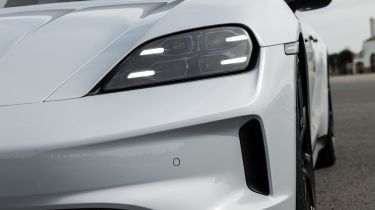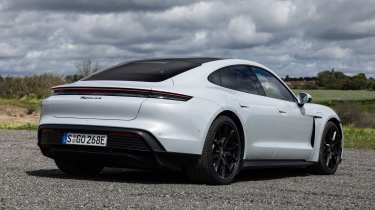Porsche Taycan: range, battery & charging
Every Porsche Taycan boasts solid range and truly rapid charging speeds
| Model | Range | Wallbox charge time | Rapid charge time |
| Taycan | 366 miles | 11hrs 15mins (0-100%, 7.4kW) | 18mins (10-80%, 270kW) |
| Taycan with Performance Battery Plus | 421 miles | 13hrs 00mins (0-100%, 7.4kW) | 18mins (10-80%, 320kW) |
| Taycan 4S | 383 miles | 11hrs 15mins (0-100%, 7.4kW) | 18mins (10-80%, 270kW) |
| Taycan 4S with Performance Battery Plus | 399 miles | 13hrs 00mins (0-100%, 7.4kW) | 18mins (10-80%, 320kW) |
There are currently five Porsche Taycan models available to order. The basic rear-wheel-drive car is simply badged 'Taycan'; above this sit the four-wheel-drive Taycan 4S, Turbo, Turbo S and Turbo GT models.
Porsche has updated the Taycan pretty consistently since it first arrived in 2019, and as a result the range figures have continued to creep upwards throughout its lifetime. However, it was the fully-fledged facelift in 2024 that saw every member of Taycan family receive a considerable boost to their respective ranges.
Both of the battery packs grew in size from 71kWh and 84kWh to 82.3kWh and 97kWh. While these will obviously help to improve things on their own, Porsche also took further steps like including a standard-fit heat pump and upgrading the peak rapid-charging capability to up to 320kW (a 50kW increase).
Porsche Taycan range
‘How long is a piece of string?’: This question is probably easier to answer than ‘how much range does a Porsche Taycan have?’, given the sheer number of different configurations possible.
Nevertheless, we’ll try to explain it all here; every Taycan now officially stands firmly above the 300-mile range mark, and opting for the base-model fitted with the 97kWh unit will result in the highest figure. This battery is optional on the base Taycan and the Taycan 4S, but becomes the standard as you move up to the pricier models.
With this ‘Performance Battery Plus’ pack, the standard rear-wheel drive Taycan can return up to 421 miles of range on the WLTP combined cycle. If you’d prefer the 4S variant with the same battery, this figure drops to 399 miles. Alternatively, if you opt for the standard Taycan or 4S with the smaller 82.3kWh battery, you’ll still have a very reasonable 366 or 383 of claimed range at your disposal.
If you’re preparing to fork out the really big bucks, both the Turbo and Turbo S can return up to 391 miles of range, while the hardcore GT models see this figure reduced to 344 miles. Naturally, if you’re pushing any version of the Taycan to the limit, you can expect these numbers to drop.
Charge time
The Taycan has some of the best charging capabilities of any electric car on sale, with a maximum rate of 320kW possible using the car’s CCS port. It's worth noting, however, that this only applies to Taycans equipped with the larger ‘Performance Battery Plus’ pack. Those with the smaller battery can only charge at up to 270kW.
If you can find a rapid charger that’s fast enough, a 10-80% charge in the Taycan should only take around 18 minutes. Alternatively, charging at a lower speed of 135kW will see the same 10-80% top-up completed in around 33 minutes.
Previously, an optional 150kW on-board charger had to be purchased in order to be sure that the Taycan could make the most of all 100-150kW DC chargers. However, this annoyance was addressed as part of the series of updates in 2024.
Of course, most owners will charge at home the vast majority of the time, where a full charge from a 7.4kW wallbox will take around 11 hours and 15 minutes for the 82.3kWh battery or 13 hours for the 97kWh unit. There’s also a charging port on both front wings of the Taycan, which is super-convenient. While both will accept the Type 2 cable needed for a wallbox, only the driver’s side takes a CCS plug for rapid charging.
A software update (standard on all cars sold since March 2021 and installable on earlier examples) added extra charging functions to the Taycan. You can set a charge level for a journey’s completion. For example, you might want at least 80% charge left when you arrive at a hotel for the night – the system will tell you when and how much to charge up to achieve this. A lower-temperature but slightly slower charge mode was also added, to help extend the life of the battery.
A further update in 2024 also saw a Charging Planner programme added to the sat-nav. This system allows you to plan charging stops while taking the level of traffic, amount of driving time needed and overall charging time into account. It will also display useful real-time information such as charger opening times, whether an individual charging station is available and details about any nearby facilities such as toilets and restaurants.


